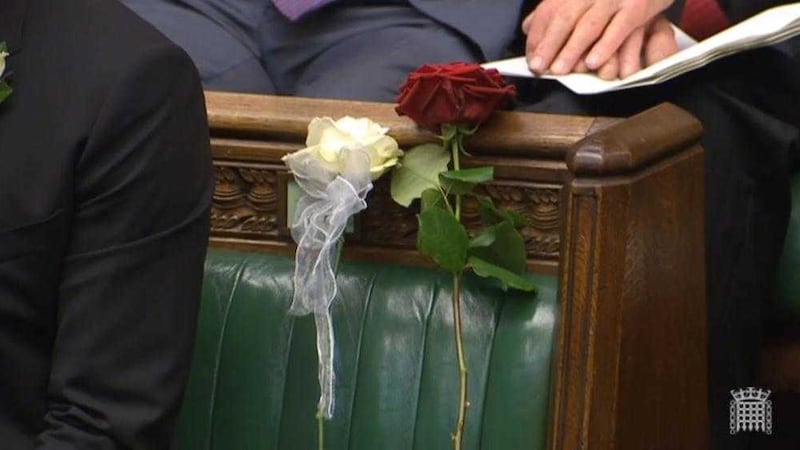BRITISH Labour MP Jo Cox was buried today - a month after she was attacked after holding a surgery for her constituents. It was a tragedy for her family and friends and a brutal day for democracy.
The violent attack on an elected representative at her daily work cannot be anything else but an attack on democracy.
Like many people, when news of her attack broke it was the first time I had heard of the MP; however, the words of her maiden speech in the House of Commons resonated.
"We have far more in common than that which divides us," she told fellow MPs.
Those words brought a welcome pause in what had become a toxic EU referendum campaign. Both sides suspended campaigning and it seemed that it was going to usher in a new, more considered debate. Her fearless, compassionate, bi-partisan brand of politics was an inspiration at a time when the debate was becoming poisonous.
Well, that didn't last long. A month on and even seasoned journalists and commentators have never previously witnessed the vicious bitterness that has enveloped the Conservative and Labour parties, while the `Remain' and `Leave' battle lines drawn in the electorate have turned the country into a seething mass of recrimination and toxicity.
In many ways the question posed in the referendum feels incidental. We might not have heard any of them, but there were plenty of cogent reasons to vote both to leave and remain in the EU. It could, and should, have been a simple bureaucratic and economic calculation, with a pinch of idealism and principle mixed in before the final `X' was marked on the ballot.
But what the result revealed is so much more than that. Post Brexit, the UK is like a sci-fi horror film where sinister gas has been released that turns everyone into vicious polar opposite versions of each other.
Even in the weird echo chamber that is Twitter, where users gravitate toward cosy fellowships where prejudices are gratifyingly reinforced with tiny red hearts, the ugly views of former comrades-in-arms are revealed in venal comments more usually stumbled across from particularly unpleasant trolls.
The worst thing about the vitriol spewing forth is that, unlike some of the cant flying around in the run-up to the vote, it clearly comes from a place of deep conviction.
Everyone is invoking the word `democracy' like it is some sort of incantation in a post-religion world - which, when you think of it, is perfect for discussing politics in a post-truth society.
Like statistics, as in `lies, damn, lies and statistics' (a phrase appropriately attributed wrongly to several great statesmen over the centuries), democracy is currently a fluid concept, meaning different things depending on who is proclaiming it virtuously.
The Labour Party is a prime example. To the parliamentary party, it is 172 - the number of MPs who opposed their leader Jeremy Corbyn in a vote of no confidence. To Corbynistas, it is 250,000 - the number of `members' who voted for him in the leadership contest 10 months ago.
To many other Labour supporters it is 9,347,304 - the number of voters who voted it back into Westminster as the official opposition.
Similarly, democracy to some Tory opponents means Britain's new prime minister Theresa May "has no mandate" because she succeeded David Cameron without being voted for by her own wider party members, never mind the country.
Others point out that it is a parliamentary democracy, which effectively means that the ruling party can put whoever they want in the top position.
An increasingly desperate faction of the `remain' camp are clinging to that notion of parliamentary democracy to insist that the EU vote be re-run in the House of Commons as it is Westminster and Westminster alone that can cede or re-assert sovereignty.
With the majority of MPs (probably a number of `leave' members included) in favour of remaining, this would effectively reverse the `will of the people' as expressed in the popular poll.
Like the referendum itself, this would all be mere intellectual debate, were it not accompanied as it has been by increasingly hysterical hate-filled rhetoric, vile insults, death threats and a physical attack on Labour challenger Angela Eagle's Merseyside office.
Ms Eagle's own Facebook tribute to her fallen colleague was hijacked by their leader's supporters posting underneath #VOTECORBYN.
As Ms Cox is remembered today, being laid to rest decades before she should have left this world, it is a source of deep sorrow that her passionate belief that "we have more in common than that which divides us" feels like a distant dream.








